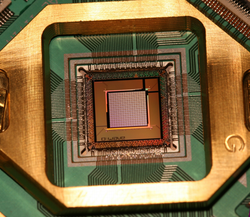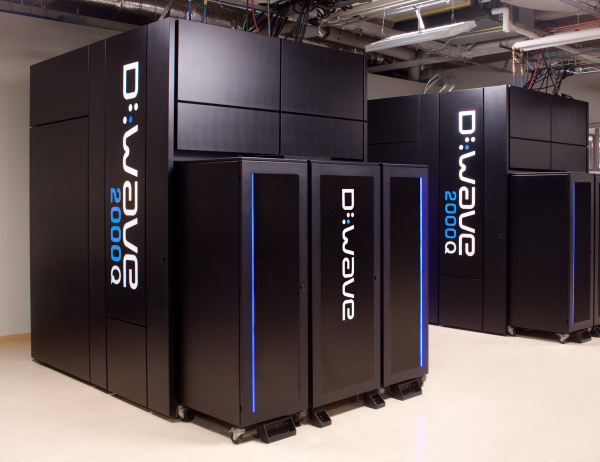
Jan. 24, 2017
By: Michael Feldman
D-Wave Systems has released 2000Q, its latest quantum computer intended to expand the scope of problems that can be run on qubit-based machinery. In conjunction with the general availability of the 2000Q, D-Wave also announced the first customer: Temporal Defense Systems Inc., a cyber security firm.
 Image: D-Wave Systems Inc.
Image: D-Wave Systems Inc.
True to its name, the 2000Q is equipped with a 2000-qubit quantum processing unit (QPU), doubling the 1000 qubits the company offered on its D-Wave 2X system launched in 2015. According to D-Wave, the new system makes good on its promise to double the number of qubits it offers every two years. Since computation time grows exponentially with problem size, more qubits enable developers to build larger, more complex applications. D-Wave points to cybersecurity and machine learning as application areas where its new system should excel. From the press release:
“Using benchmark problems that are both challenging and relevant to real-world applications, the D-Wave 2000Q system outperformed highly specialized algorithms run on state-of-the-art classical servers by factors of 1000 to 10000 times. These benchmarks were optimization and sampling problems relevant to machine learning.”
In this case, the “classical servers” were systems equipped with either an Intel CPU (Xeon E5-2643 v3 running at 3.4 GHz) or an NVIDIA GPU (GeForce GTX 1080 running at 1.6 GHz). The comparisons were based on execution time on a single Xeon core or on the entire GeForce GPU – 2560 cores – using the largest problem size.
The benchmarks employed were actually four solvers: simulated annealing, quantum Monte Carlo, spin vector Monte Carlo, and the Hamze-de Freitas-Selby (HFS) algorithm. The idea here is that unlike previous benchmark comparisons that specifically favored D-Wave’s quantum annealing hardware, these algorithms are employed in real-world applications implemented on conventional hardware.
The three to four orders of magnitude performance advantage of the D-Wave QPU for these solvers is rather impressive, given that, with the exception of HFS, they are well suited to GPU acceleration. Besides pure computational speed, D-Wave also demonstrated better energy-efficiency across these solvers – on the order of 100 times better performance per watt compared to a GPU implementation. Of course, none of these measured execution for an entire application, so factoring in data management, I/O and other non-algorithmic aspects of the code would undoubtedly narrow the advantage of the D-Wave hardware over traditional computers. Then there's the additional challenge of implementing code for a quantum annealing architecture.
However, at least one customer is convinced of the advantages of a 2000Q for real-world applications. Temporal Defense Systems (TDS) has purchased a system with the idea of applying it to their cyber security business. In a prepared statement for the press announcement:
“The combined power of the TDS / D-Wave quantum cyber solution will revolutionize secure communications, protect against insider threats, and assist in the identification of cyber adversaries and attack patterns,” said James Burrell, TDS Chief Technology Officer and former FBI Deputy Assistant Director. "Combining the unique computational capabilities of a quantum computer with the most advanced cyber security technologies will deliver the highest level of security, focused on both prevention and attribution of cyber attacks."
Although exact terms of the TDS purchase were not made public, D-Wave stated that a 2000Q machine is “valued at $15 million.”
